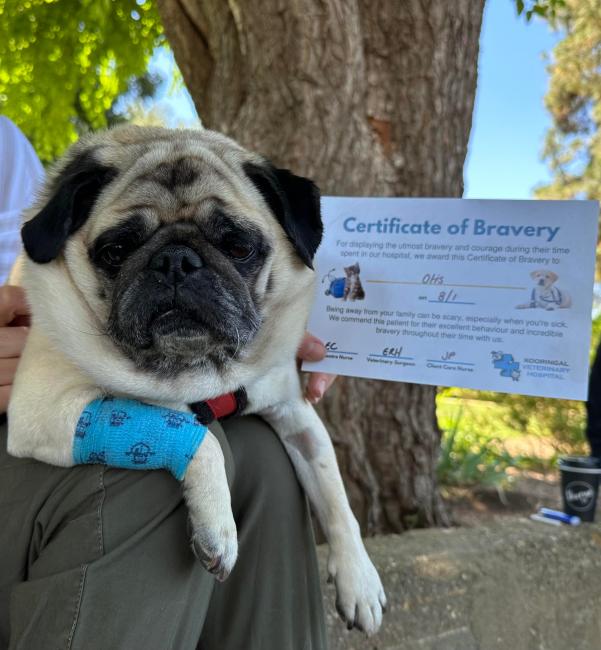
Otis is a plucky little Pug who battled an autoimmune disease with a very strange source.
Otis presented to us as an after-hours emergency case after being swarmed by dozens of honey bees and stung all over his poor little head. To add to the matter, Otis’ parents were abroad in Canada, so an emergency consultation was conducted via FaceTime between Dr. Ethan at our hospital and Otis' Mum & Dad from the top of a snowy mountain in North America! The bees' attack was severe but Otis’ quick-thinking family moved him into the swimming pool where he was safe from further stings. Otis entered anaphylactic shock and was rushed to our care, though by the time he'd reached us most symptoms had subsided aside from some pain and vomiting. With assessment by Dr. Ethan he was administered medication to treat his clinical signs, as well as prevent ongoing muscle damage and allergic response. Otis was admitted into our hospital for an overnight stay so we could closely monitor his recovery.
Within 24 hours Otis took an unexpected turn, beginning to urinate red and quieting from his usual chatty self. Our team knew something was awry and rapidly began investigating. A blood test found Otis to be extremely low in red blood cells - highly irregular for his situation. After ruling out snake envenomation (a much more common culprit for a sudden low blood cell count), a diagnosis of secondary Immune Mediated Haemolytic Anaemia was made. After observing a decrease in red blood cell volume within 12 hours we quickly began preparing for a whole blood transfusion. Blood was generously donated by Miss Gucci the German Shepherd, a regular doggy-donor owned by one of our fantastic Nurses, Isla. Following the transfusion Otis was started on immunosuppressant medication and antimicrobials to prevent a secondary infection. This treatment plan worked wonders, and within three days Otis was discharged from hospital to continue to his recovery from home, with regular visits to confirm his treatment trajectory.
Otis' case, though not unprecedented, is EXTREMELY rare. Massive envenomation from bees is highly uncommon and as such is not thoroughly reported in literature, however we've been extremely pleased to learn from our colleagues across the country that Otis' recovery period is far shorter than average. Many of these cases require long term hospitalisation and treatment, and our rapid blood transfusion was the key to preventing the progression of this disease.
It is also important to note that Otis is a Pug. This breed is typically affected by Brachycephalic Obstructive Airway disease (BOAS) which causes reduced airway space and difficulty breathing. Otis thankfully has had corrective surgery for this in the past, which we strongly believe was the reason he was able to survive the initial anaphylactic shock. Well done to Otis’ wonderful family for the preventative and ongoing care you’ve given this beautiful little man - he would not be here without your foresight!
For more information on Brachycephalic Obstructive Airway Syndrome, which is prevalent in all Pugs, Bulldog breeds and Cavalier King Charles Spaniels, please don’t hesitate to book to see one of our Vets at Kooringal Veterinary Hospital for assessment and minimally invasive surgical correction if required. Give us a call on (02) 6922 5375 to inquire!